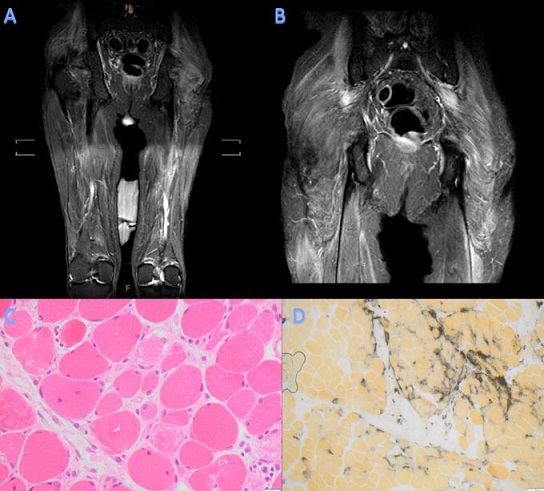New insights into post-COVID autoimmune conditions, a case of Anti-OJ Antibody-Positive Anti-Synthetase Syndrome
Nikhil Prasad Fact checked by:Thailand Medical News Team Aug 29, 2024 1 year, 3 months, 3 weeks, 16 hours, 46 minutes ago
Medical News: A New Chapter in Post-COVID Complications
In a groundbreaking case, researchers from The Royal Melbourne Hospital, St Vincent’s Hospital, and The Alfred Hospital in Australia have reported the first documented instance of a patient developing anti-OJ antibody-positive anti-synthetase syndrome (ASSD) following a SARS-CoV-2 infection. This
Medical News report delves into the intriguing findings of the study, shedding light on how COVID-19 might trigger complex autoimmune responses in certain individuals.
 New insights into post-COVID autoimmune conditions, a case of Anti-OJ Antibody-Positive Anti-Synthetase Syndrome
A, B MRI shows high signals on STIR bilateral thighs demonstrating mild diffuse myositis of the gluteal muscles and the muscles of the posterior thigh with mild generalised fatty atrophy. MRI, magnetic resonance imaging; STIR, short T1 inversion recovery. [C] High power image of the skeletal muscle showing peri fascicular degeneration of muscle fibres x 400 actual magnification, Haematoxylin and Eosin. [D] Low power image showing upregulation of alkaline phosphatase (black) in a peri fascicular pattern x 100 actual magnification, Alkaline phosphatase
The Case Unfolds: From COVID-19 to a Rare Autoimmune Disorder
New insights into post-COVID autoimmune conditions, a case of Anti-OJ Antibody-Positive Anti-Synthetase Syndrome
A, B MRI shows high signals on STIR bilateral thighs demonstrating mild diffuse myositis of the gluteal muscles and the muscles of the posterior thigh with mild generalised fatty atrophy. MRI, magnetic resonance imaging; STIR, short T1 inversion recovery. [C] High power image of the skeletal muscle showing peri fascicular degeneration of muscle fibres x 400 actual magnification, Haematoxylin and Eosin. [D] Low power image showing upregulation of alkaline phosphatase (black) in a peri fascicular pattern x 100 actual magnification, Alkaline phosphatase
The Case Unfolds: From COVID-19 to a Rare Autoimmune Disorder
The subject of this case study is a 70-year-old man who initially presented with typical COVID-19 symptoms, including dyspnea, fatigue, and myalgias. After recovering from the acute phase of the infection, the patient’s health took an unexpected turn. He began experiencing severe weakness, especially in the muscles of the upper and lower limbs, along with other symptoms that suggested a deeper, underlying condition.
A Closer Look at Anti-Synthetase Syndrome
Anti-synthetase syndrome (ASSD) is a complex and often debilitating condition characterized by myositis (inflammation of the muscles), interstitial lung disease (ILD), arthritis, and other systemic symptoms. The syndrome is associated with specific autoantibodies, including anti-OJ, which target aminoacyl-tRNA synthetases involved in protein synthesis. The study focuses on the role of these autoantibodies in the pathogenesis of ASSD, particularly in the context of a post-COVID-19 immune response.
The Path to Diagnosis: A Challenging Journey
Diagnosing ASSD in the patient was not straightforward. Initially, the patient’s symptoms were attributed to long COVID, a term used to describe the lingering effects of the virus. However, as the symptoms persisted and evolved, the medical team suspected an autoimmune process. A battery of tests, including myositis immunoblot assays and muscle biopsies, revealed the presence of anti-OJ antibodies and confirmed the diagnosis of ASSD. The case study highlights the diagnostic challenges faced by the healthcare team and the importance of considering autoimmune disorders in post-COVID-19 patients.
Treatment and Management: Navigating a Comple
x Condition
Once the diagnosis was confirmed, the patient received an aggressive treatment regimen, including high-dose corticosteroids, immunoglobulin therapy, and immunosuppressive drugs like azathioprine. The aim was to control the inflammation and prevent further damage to the muscles and lungs. The patient responded well to the treatment, with significant improvements in muscle strength and overall function. This case underscores the importance of early and targeted treatment in managing ASSD and similar autoimmune conditions.
Understanding the Link Between COVID-19 and Autoimmunity
The case raises critical questions about the relationship between SARS-CoV-2 and autoimmune diseases. Researchers propose several mechanisms by which the virus could trigger autoimmunity, including molecular mimicry, where viral proteins resemble human proteins and prompt the immune system to attack its own tissues. The study also explores the role of cytokine storms, a hyperactive immune response commonly seen in severe COVID-19 cases, in precipitating autoimmune conditions like ASSD.
Expanding the Research: The Need for Further Studies
While this case provides valuable insights into the potential link between COVID-19 and autoimmune diseases, it also highlights the need for further research. Understanding the mechanisms underlying virus-triggered autoimmunity could pave the way for better prevention and treatment strategies, not just for COVID-19 but for other viral infections that may have similar effects on the immune system.
Conclusion: A Call for Vigilance in Post-COVID Care
This case of anti-OJ antibody-positive ASSD following a SARS-CoV-2 infection serves as a stark reminder of the long-term health risks associated with COVID-19. It emphasizes the importance of continued monitoring and research to fully understand and address the potential autoimmune complications of the virus. As we move forward in the fight against COVID-19, healthcare professionals must remain vigilant and consider the possibility of autoimmune conditions in patients with prolonged or unusual symptoms after infection.
The study findings were published in the peer-reviewed journal: BMC Rheumatology.
https://link.springer.com/article/10.1186/s41927-024-00406-6
For the latest COVID-19 News, keep on logging to Thailand
Medical News.
Read Also:
https://www.thailandmedical.news/news/study-finds-that-covid-19-is-causing-rise-in-mda5-autoimmune-lung-disease
https://www.thailandmedical.news/news/breaking-covid-19-news-scientists-from-university-of-texas-warn-that-sars-cov-2-can-also-cause-seronegative-autoimmune-hepatitis-in-adults
https://www.thailandmedical.news/news/covid-19-news-new-york-doctors-warn-that-even-mild-covid-19-can-lead-to-anti-n-methyl-d-aspartate-autoimmune-encephalitis-with-psychotic-symptoms
